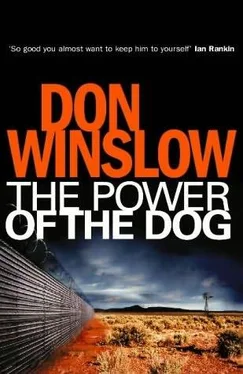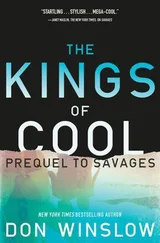Don Winslow - The Power of the Dog
Здесь есть возможность читать онлайн «Don Winslow - The Power of the Dog» весь текст электронной книги совершенно бесплатно (целиком полную версию без сокращений). В некоторых случаях можно слушать аудио, скачать через торрент в формате fb2 и присутствует краткое содержание. Жанр: Триллер, на английском языке. Описание произведения, (предисловие) а так же отзывы посетителей доступны на портале библиотеки ЛибКат.
- Название:The Power of the Dog
- Автор:
- Жанр:
- Год:неизвестен
- ISBN:нет данных
- Рейтинг книги:3 / 5. Голосов: 1
-
Избранное:Добавить в избранное
- Отзывы:
-
Ваша оценка:
- 60
- 1
- 2
- 3
- 4
- 5
The Power of the Dog: краткое содержание, описание и аннотация
Предлагаем к чтению аннотацию, описание, краткое содержание или предисловие (зависит от того, что написал сам автор книги «The Power of the Dog»). Если вы не нашли необходимую информацию о книге — напишите в комментариях, мы постараемся отыскать её.
The Power of the Dog — читать онлайн бесплатно полную книгу (весь текст) целиком
Ниже представлен текст книги, разбитый по страницам. Система сохранения места последней прочитанной страницы, позволяет с удобством читать онлайн бесплатно книгу «The Power of the Dog», без необходимости каждый раз заново искать на чём Вы остановились. Поставьте закладку, и сможете в любой момент перейти на страницу, на которой закончили чтение.
Интервал:
Закладка:
What they did, in the simplest possible terms: They sold the country to the narcotraficantes.
He wouldn’t have believed it if he hadn’t heard it himself: Tapes from a dinner-$25 million per plate-to help elect this president. The murders of election officials and the theft of the election itself. The voices of the president’s brother and the attorney general planning these outrages. And soliciting the narcos to pay for it all. And to commit the murders. And to torture and murder the American agent Hidalgo.
And then there was Operation Cerberus, the conspiracy to fund, equip and train the Contras through the sale of cocaine.
And Operation Red Mist, the right-wing murders funded in part by the drug cartels in Colombia and Mexico and supported by the PRI.
Small wonder Cerro is afraid of hell-he’s helped to build it here.
And now I understand why he brought this evidence to me. The voices on the tapes, the names on the memos-the president, his brother, the secretary of state, Miguel Angel Barrera, Garcia Abrego, Guero Mendez, Adan Barrera, the literally scores of police, army and intelligence officers, PRI officials-there is no one in Mexico who can or will act on this.
So Cerro brings it to me. Wanting me to give it to…
Whom?
He goes to light another cigarette but finds to his surprise that he’s sick of smoking-his mouth tastes filthy. He goes upstairs and brushes his teeth, then takes an almost scalding shower and, as he lets the water pound the back of his neck, thinks that perhaps he should give this evidence to Arthur Keller.
He’s maintained frequent correspondence with the American, now unfortunately persona non grata in Mexico, and the man is still obsessed with bringing down the drug cartels. But think it through, he tells himself: If you give this to Arthur, what will happen to it, given the shocking revelation of Operation Cerberus and the CIA’s complicity with the Barreras in exchange for Contra funding? Does Arthur have the power to act on this, or will it be suppressed by the current administration? Or any American administration, as focused as they are on NAFTA?
NAFTA, Parada thinks with disgust. The cliff we are marching toward in lockstep with the Americans. But there is hope. Presidential elections are coming up, and the PRI’s candidate-who will, perforce, win-seems to be a good man. Luis Donaldo Colosio is a legitimate man of the left, who will listen to reason. Parada has sat down with him, and the man is sympathetic.
And if this stunning evidence that the dying Cerro brought me can discredit the dinosaurs in the PRI, that might give Colosio the leverage he needs to follow his true instincts. Should I give him the information?
No, Parada thinks, Colosio mustn’t be seen to be going against his party-that would only rob him of the nomination.
So who, Parada wonders as he lathers his face and begins to shave, has the autonomy, the power, the sheer moral force to bring to light the fact that the entire government of a country has auctioned itself to a cartel of drug merchants? Who?
The answer occurs to him suddenly.
It’s obvious.
He waits until a decent hour of the morning, and then phones Antonucci to tell him that he wants to relay important information to the Pope.
The order of Opus Dei was founded in 1928 by a wealthy Spanish lawyer-turned-priest named Josemaria Escriva, who was concerned that the University of Madrid had become a hotbed of left-wing radicalism. He was so concerned that his new organization of Catholic elite fought on the side of the fascists in the Spanish Civil War and spent the next thirty years helping to entrench General Franco in power. The idea was to recruit talented, elite young lay conservatives who were headed into government, the press and big business, imbue them with “traditional” Catholic values-especially anti-Communism-and send them out to do the Church’s work in their chosen spheres.
Salvatore Scachi-Special Forces colonel, CIA asset, Knight of Malta and made Mafia wise guy-is a tried-and-true member of Opus Dei. He met all the requirements-attended Mass daily, made his confessions only to an Opus Dei priest and made regular retreats at Opus Dei facilities.
And he’s been a good soldier. He’s fought the good fight against Communism in Vietnam, Cambodia and the Golden Triangle. He’s fought the war in Mexico, in Central America through Cerberus, in South America through Red Mist-all operations that the liberation theologist Parada is now threatening to expose to the world. Now he sits in Antonucci’s office considering what to do about the information that Cardinal Juan Parada wants to pass on to the Vatican.
“You say Cerro went to see him,” Scachi says to Antonucci.
“That’s what Parada told me.”
“Cerro knows enough to bring down the entire government,” Scachi says. And then some.
“We can’t burden the Holy Father with this information,” Antonucci says. This Pope has been a major supporter of Opus Dei, even to the point of recently beatifying Father Escriva, the first step toward canonization. To force him to confront evidence of the Order’s involvement in some of the harsher actions against the Communist world conspiracy would be, at the very least, embarrassing.
Worse yet would be the scandal that would erupt against the present government, just as negotiations are proceeding to return the Church to full legal status in Mexico. No, these revelations would scuttle the government, and with it the negotiations, and swing momentum toward the heretical liberation theologists-many of them well-meaning “useful idiots” who would help bring about Communist rule.
It’s been the same story everywhere, Antonucci thinks-stupid, misled, liberal priests help bring the Communists to power, then the reds slaughter the priests. It was certainly true in Spain, which is why the blessed Escriva founded the order in the first place.
As members of Opus Dei, both Antonucci and Scachi are well versed in the concept of the greater good, and for Sal Scachi the greater good of defeating Communism outweighs the evil of corruption. He also has something else on his mind-the NAFTA treaty, still under debate in Congress. If Parada’s revelations were ever made public they would scuttle NAFTA. And without NAFTA, there will be no hope for the development of a Mexican middle class, which is the only long-term antidote for the poisonous spread of Communism.
Now Antonucci says, “We have an opportunity here to do something great for the souls of the millions of faithful-to return the true Church to the Mexican people by earning the gratitude of the Mexican government.”
“If we suppress this information.”
“Just so.”
“But it’s not that simple,” Scachi says. “Parada apparently has certain knowledge, which he’ll come forward with if he doesn’t see-”
Antonucci gets up. “I must leave such worldly details to the lay brothers of the order. I don’t understand such things.”
But Scachi does.
Adan lies in bed at Rancho las Bardas, Raul’s large estancia-cum-fortress, off the road between Tijuana and Tecate.
The ranch’s main living compound, composed of separate houses for Adan and Raul, is surrounded by a ten-foot wall topped with razor wire and shards of broken glass bottles. There are two gates, each with massive, steel-reinforced doors. Spotlight towers are set in each corner, manned by guards with AK-47s, M-50 machine guns and Chinese rocket launchers.
And to even reach the place, you have to drive two long miles off the highway down a red-dirt road, but the chances are you’re not even going to get on that road, because the junction with the highway is guarded twenty-four-seven by plainclothes Baja state policemen.
So this is where the brothers came as soon as possible after the attack on the La Sirena disco, and now the place is on high alert. Guards patrol the walls night and day, squads in jeeps patrol the surrounding countryside, technicians electronically sweep the area for radio transmissions and cell-phone calls.
Читать дальшеИнтервал:
Закладка:
Похожие книги на «The Power of the Dog»
Представляем Вашему вниманию похожие книги на «The Power of the Dog» списком для выбора. Мы отобрали схожую по названию и смыслу литературу в надежде предоставить читателям больше вариантов отыскать новые, интересные, ещё непрочитанные произведения.
Обсуждение, отзывы о книге «The Power of the Dog» и просто собственные мнения читателей. Оставьте ваши комментарии, напишите, что Вы думаете о произведении, его смысле или главных героях. Укажите что конкретно понравилось, а что нет, и почему Вы так считаете.












